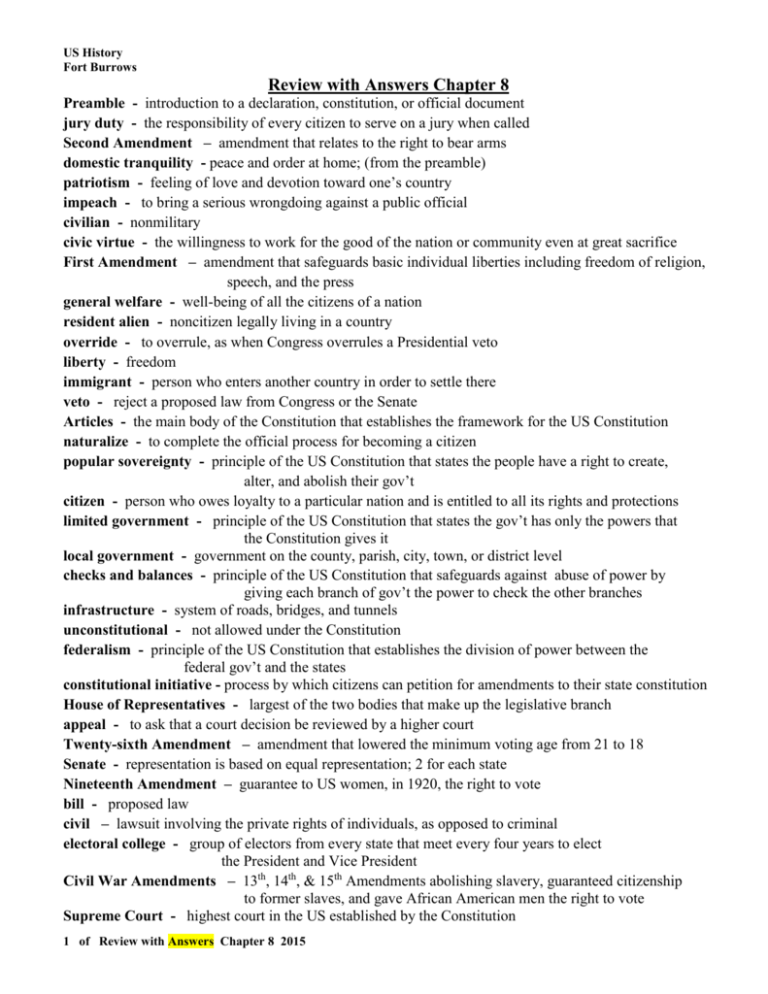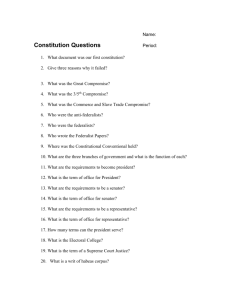Check your Homework / Review Packet Answers
advertisement

US History Fort Burrows Review with Answers Chapter 8 Preamble - introduction to a declaration, constitution, or official document jury duty - the responsibility of every citizen to serve on a jury when called Second Amendment – amendment that relates to the right to bear arms domestic tranquility - peace and order at home; (from the preamble) patriotism - feeling of love and devotion toward one’s country impeach - to bring a serious wrongdoing against a public official civilian - nonmilitary civic virtue - the willingness to work for the good of the nation or community even at great sacrifice First Amendment – amendment that safeguards basic individual liberties including freedom of religion, speech, and the press general welfare - well-being of all the citizens of a nation resident alien - noncitizen legally living in a country override - to overrule, as when Congress overrules a Presidential veto liberty - freedom immigrant - person who enters another country in order to settle there veto - reject a proposed law from Congress or the Senate Articles - the main body of the Constitution that establishes the framework for the US Constitution naturalize - to complete the official process for becoming a citizen popular sovereignty - principle of the US Constitution that states the people have a right to create, alter, and abolish their gov’t citizen - person who owes loyalty to a particular nation and is entitled to all its rights and protections limited government - principle of the US Constitution that states the gov’t has only the powers that the Constitution gives it local government - government on the county, parish, city, town, or district level checks and balances - principle of the US Constitution that safeguards against abuse of power by giving each branch of gov’t the power to check the other branches infrastructure - system of roads, bridges, and tunnels unconstitutional - not allowed under the Constitution federalism - principle of the US Constitution that establishes the division of power between the federal gov’t and the states constitutional initiative - process by which citizens can petition for amendments to their state constitution House of Representatives - largest of the two bodies that make up the legislative branch appeal - to ask that a court decision be reviewed by a higher court Twenty-sixth Amendment – amendment that lowered the minimum voting age from 21 to 18 Senate - representation is based on equal representation; 2 for each state Nineteenth Amendment – guarantee to US women, in 1920, the right to vote bill - proposed law civil – lawsuit involving the private rights of individuals, as opposed to criminal electoral college - group of electors from every state that meet every four years to elect the President and Vice President Civil War Amendments – 13th, 14th, & 15th Amendments abolishing slavery, guaranteed citizenship to former slaves, and gave African American men the right to vote Supreme Court - highest court in the US established by the Constitution 1 of Review with Answers Chapter 8 2015 US History Fort Burrows incriminate – to give evidence against conscription - compulsory enlistment for state service, typically into the armed forces citizen – person who owes loyalty to a particular nation and is entitled to all its rights and protections confederation – group created for mutual support or common action resolve – to deal with something successfully ordinance – a law set forth by a government authority avert – to avoid revise – to change endorse – to express support or approval of free enterprise – freedom of private business to organize and operate for profit in a competitive system without interference from government contract – binding agreement between two or more people pen name – factious name used by an author compelled - forced subsequent – following in time, order, or place pardon – the excusing of an offense without exacting a penalty pledge – to hold by a binding promise or agreement infringed – interfere with or put limits on servitude – a condition in which one lacks liberties habeas corpus – the idea that no person could be held in prison without first being charged with a specific crime 1. List the powers and lack of powers to describe the Articles of Confederation A. did not have power to regulate trade between states B. did not have not one person in power to execute the laws C. did have power to pass laws with 9 of the 13 states’ approval D. could not coin money 2. What is the process to amend the US Constitution ? A. proposed by Congress with a 2/3 vote in both House B. ratified by the Legislatures of 3/4 of the States 3. What is the First Amendment to the U.S. Constitution ? Freedoms of – religion, speech, press, peaceful assembly, and petition 4. Which Amendments granted civil rights primarily to African Americans ? 13th, 14th and 15th 5. Describe the unique parts of the Virginia Plan. Wanted all congressmen to be based on population 6. Describe the unique parts of the New Jersey. Wanted all congressmen to be awarded equally by state 7. Why was the Bill of Rights added to the U.S. Constitution ? 8. List the major Federalist that supported the Constitution. Ben Franklin, Alexander Hamilton, James Madison 9. List the major Anti-Federalist that did not support the Constitution. 2 of Review with Answers Chapter 8 2015 protect individual rights George Mason, US History Fort Burrows 10. Why didn’t the Anti-Federalist support the Constitution ? Lacked the individual citizens’ written rights 11. What are the requirements to serve in the Executive Branch ? 1. US resident for 14 years 2. at least 35 years of age 3. natural born citizen 12. Which principle of the US Constitution states each branch of the government can limit the power of the other two ? checks and balances 13. Describe the examples taken from the Romans when writing the US Constitution. A. public service to citizens B. independence for all individuals C. devotion to the republic 14. List the Preamble goals of the United States Constitution ? 1. establish justice 3. insure domestic tranquility 5. secure the blessings of liberty 15. 2. promote general welfare 4. provide for the common defense 6. form a more perfect List the powers of Congress… 1. make the nation’s laws 3. borrow money 5. impeach the President 2. collect taxes 4. coin money 6. declare war 16. What major event happened in America as a result of and at the end of the Revolution ? A. Farm goods dropped in value and demand, B. Farmers revolted the increased taxes C. an economic depression hit the new United States 17. How does the Supreme Court check the power of the Legislative Branch ? declaring a law unconstitutional 18. What was a major concern for the Anti-Federalists regarding the Executive Branch ? The President could become to powerful, like King George III 19. What is the term for the House of Representatives ? _________2 years 20. Describe what Article VI means when it states, “Supreme Law of the Land” ? A. Above all other laws B. established the power of the Federal Government 21. What is the term for a Senator ? _____________6 years 22. What is required to propose an amendment to the US Constitution ? support of two thirds of both the House and the Senate 3 of Review with Answers Chapter 8 2015 US History Fort Burrows 23. List the 3 major components of the 1689, English Bill of Rights… A. regular Parliamentary elections B. right to bear arms C. right of habeas corpus 24. What do the 14th, 15th, 19th, and 26th Amendments have in common ? voting rights 25. What is the majority reason for the Amendment of the US Constitution ? to reflect the views and believes of the majority List examples. 14th, 15th , 19th, 26th 26. What services do state and local governments have in common ? provide law enforcement and education services 27. What is the main difference between the state constitution and US Constitution ? State constitution is longer and contains more details 28. What are the 5 responsibilities of citizenship ? 1. vote 3. serve on jury 5. be informed 2. obey the law 4. serve the community / volunteering 29. Which of the grievance against England listed in the Declaration of Independence was later addressed in the Bill of Rights ? trial by jury 30. Which principle of the Constitution states that citizens will elect representatives to carry out their will ? Republicanism 31. List the main services provided by state governments ? 1. 2. 3. 4. Law enforcement Supervise public education Provide public health and welfare programs License professionals (doctors, nurses, lawyers) 32. What are the 3 main parts to the US Constitution ? Preamble, Articles and Amendments (PAA) 33. List the powers the US Constitution gives to the Executive Branch ? call special sessions of Congress, direct foreign policy, grant pardons 34. Why did the framers of the Constitution add the system of checks and balances ? to prevent the rise of an all-powerful leader 35. How did later amendments expand democratic rights ? they gave more US citizens the right to vote 4 of Review with Answers Chapter 8 2015 US History Fort Burrows 36. How is the State Constitutions similar to the National Constitution ? both have three branches, a preamble, and a bill of rights 37. What makes a person a citizen of the United States ? 1. you were born in the US 2. you have been naturalized 3. you were 18 or younger when your parents were naturalized 38. How is the Judicial branch court system organized ? District, Appellate, Supreme (DAS) 39. List the 7 Principles of American Government… 1. 2. 3. 4. 5. 6. 7. Popular Sovereignty Limited Government Separation of Powers Checks and Balances Federalism Republicanism Individual Rights 40. Judicial Branch - _____interprets_______ the laws 41. Legislative Branch - ____makes__________ the laws 42. Executive Branch - _____carries out______ the laws List the seven (7) Articles of the Constitution… Legislative Branch Executive Branch Judicial Branch Relations between states/system for admitting new states Process to amend Constitution States’ laws cannot violate Constitution Procedure for states to ratify constitution 43. 1. 2. 3. 4. 5. 6. 7. 44. Name the two Presidents that have been impeached… 1.___Andrew Johnson___________________________________________ 2. ____Bill Clinton_______________________________________________ 45. Name the 1st African American woman to serve in the US Congress from Texas ______Barbara Jordan________________________________________ 46. How many amendments have been made to the US Constitution ? __27_____ 47. How many members sit on the Supreme Court ? ____9________ 48. What system is used for electing the President ? __Electoral College______ 5 of Review with Answers Chapter 8 2015









